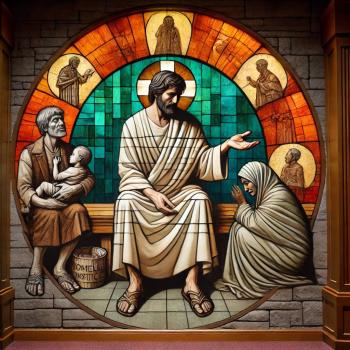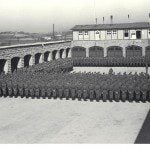
When Muhammad Ali is laid to rest Friday, it will be in Cave Hill Cemetery, in my hometown of Louisville, Kentucky.
At nearly 300 acres, it’s the largest cemetery in Louisville. My mother learned to drive on the narrow, isolated roads. Both of her parents are buried there.
Dedicated in 1848, the cemetery retains the lush landscaping of the Victorian era. Both Confederate and Union solders are there, divided in life, but united again in death.
The cemetery was integrated in 1870, when blacks were finally admitted. Equal in death.
My first trip to Cave Hill was as a pallbearer for my grandfather. I returned often before my grandmother joined her husband there.
Until this week, the best know resident of Cave Hill was Indiana-born Harlan Sanders. You know him as Col. Sanders. So many people were curious to see his final resting place, that the staff painted a yellow line from the cemetery entrance to the grave.

I haven’t lived in Kentucky since I was four. But for nearly the first 27 years of my life, I returned to Louisville for Christmas and some summers. Most of my family was there.
Both of my parents met Muhammad Ali – my father before he and Cassius Clay graduated high school, my mother after he became Muhammad.
Mom remembers when Walnut Street was renamed Muhammad Ali Blvd. Although Ali was beloved in our hometown, there was opposition to the name change based upon his refusal to be drafted in 1967:
… with a professional record of 29-0, Ali was stripped of all his heavyweight titles when he would not step forward for induction into the armed forces for the Vietnam War.
The Courier-Journal the next day included, at the bottom of the front page, this headline: “Clay refuses induction; to lose boxing crown.”
From the wire service story: “Clay — or as his induction papers said, ‘otherwise known as Muhammad Ali’ — made good his promise not to take the traditional step forward that would have symbolized and confirmed his induction. He said his decision was based on his conviction that he could not remain true to his religious beliefs and serve in the military. He is a member of the Black Muslim faith.”
Ali was arrested, but avoided jail as legal appeals were pursued. Meeting with the press after his induction hearing, for once, Ali spoke not a word, but issued a statement, which read, “I strongly object to the fact that so many newspapers have given to the American public and the world the impression that I have only two alternatives in taking this stand: Either I go to jail or go to the Army. There is another alternative, and that alternative is justice.”
More famously, later, he was quoted as saying: “Man, I ain’t got no quarrel with them Viet Cong, no Viet Cong ever called me ‘nigger.'”
Three years later, the U.S. Supreme Court threw out his conviction.
But during those three years, he would not be able to box. Dundee always reminded reporters that in that time, Ali was in his prime. He lost millions of dollars in earnings. When British interviewer David Frost asked him about that, saying that, “You have thrown away perhaps the greatest sports career since the war,” Ali was indignant.
“I haven’t thrown it away, I haven’t lost it. I would say I turned it down,” Ali said. “See, the greatest sports title means nothing, Mister, if you cannot be free. See? Boys in Vietnam are throwing away, you may say, their lives. I haven’t did that much. I’m still living. They are dying today to free somebody they don’t know. So what the hell is a heavyweight title, and a few stinky dollar bills, for my people’s freedom?”
Ali surrendered his career, because his faith was more important. An elite professional athlete, he was prohibited from earning a living.
His faith remained at the base of all he did, as his fame and reputation superseded his physical accomplishments.
“It was this quality of Ali’s that I have always admired the most: his unique ability to summon extraordinary strength and courage in the face of adversity, to navigate the storm and never lose his way. … This is the quality I’m reminded of when I look at the iconic photo I’ve had hanging on my wall of the young fighter standing over Sonny Liston. And in the end, it was this quality that would come to define not just Ali the boxer but Ali the man — the Ali I know who made his most lasting contribution as his physical powers ebbed, becoming a force for reconciliation and peace around the world.” — President Barack Obama

After years of failing health, now he is gone.
Equal in death, as we all will be.
“Death is the tax a soul has to pay for having a name and a form.” — Muhammad Ali
From the richest to the poorest, from the greatest to the smallest, Christian, Muslim, brown or white, all of us will be claimed by death. Rather than revel in his riches, or strive to make more money with his likeness and reputation, Ali worked as an ambassador to the world. He dedicated his final years to reconciliation and peace.
When I learned he would be buried at Cave Hill, a favorite son returned home forever, I was reminded of a poem.
Spoon River Anthology
Edgar Lee Masters
1. The Hill
WHERE are Elmer, Herman, Bert, Tom and Charley,
The weak of will, the strong of arm, the clown, the boozer, the fighter?
All, all, are sleeping on the hill.
*
Where are Ella, Kate, Mag, Lizzie and Edith,
The tender heart, the simple soul, the loud, the proud, the happy one?—
All, all, are sleeping on the hill.
Sleep well, Champ.












